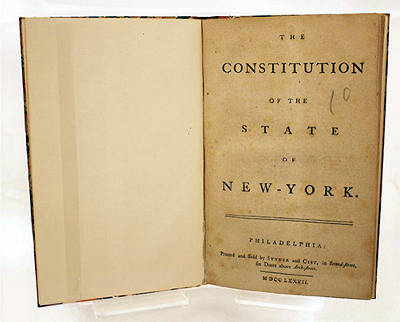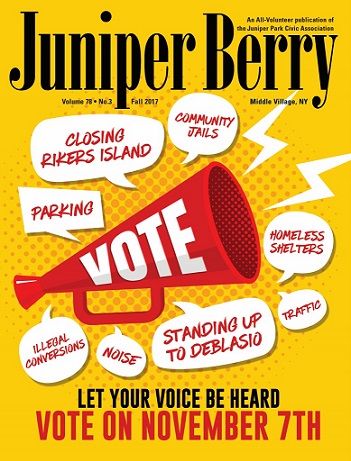Given the history of convictions – most recently that of former State Assembly Speaker Sheldon Silver and former State Senate Majority Leader Dean G. Skelos – it is obvious that the responsibility of cleaning up Albany must come from outside forces. Albany cannot manage or fix itself. Hence, it is clear that significant changes are long overdue, and one sure way to clean house and enact such needed reforms is through amending the New York State Constitution.
There are currently two methods available to make proposed amendments to the state’s constitution, both of which require a final vote of approval by the people. The first is through the legislature whereby two separately elected legislatures vote to place a constitutional amendment on the ballot and second, by the vote of the people to hold a Constitutional Convention or “con con” as it is also known.
The NYS Constitution, created in 1777, allows voters to decide every 20 years if a state constitutional convention is warranted and 2017 is one of those pivotal moments.
So included on the ballot in this November’s election is that rare chance for New York State residents to take control as to whether or not to hold a con con, or keep the Constitution as it is and let the folks in Albany decide what changes, if any, need to be made.
There will be numerous advertisements both for and against holding a con con in the coming weeks, but what it all means is that if New Yorkers vote YES on the ballot this November to hold a con con, New York State’s Constitution will have a chance to be amended, updated or completely revised. The next step would take place the following year in November 2018 when New Yorkers would vote for 204 delegates (three delegates from each of the 63 New York State Senatorial districts plus 15 at-large delegates.) These delegates would meet at the convention in Albany on the first Tuesday in April 2019 and would work together to recommend changes or amendments to the Constitution. Voters would again be called upon in November 2019 to vote whether or not to accept the recommendations made by the delegates.
In a February 2017 New York Daily News article, New York Governor Andrew Cuomo said he conceptually supports the idea of a constitutional convention and added, “You have to find a way where the delegates do not wind up being the same legislators who you are trying to change the rules on…. The way it will work is you'll probably elect assemblymen and senators as delegates. And the unions will probably fund the campaigns. And you may make the situation worse, not better.”
Bob Schulz, Chairman of We The People Foundation for Constitutional Education, Inc. agrees that there exists the major conflict of interest that Cuomo alluded to when looking at the selection process for convention delegates. And Schulz strongly opposes the current rules that allow judges, legislators and other state and local government officials to have the opportunity to run for constitutional convention delegate. “Having as delegates those who are regulated by the Constitution is the ultimate conflict of interest,” Schulz said.
Schulz contends that the New York State Constitution is the people’s document, not the government’s document and that it was created to stand between the people and government. He added that because citizens remembered the lopsided, self-serving amendments agreed to by the 1967 delegates who were mostly legislators or connected to government, people voted no to the con cons of 1977 and 1997 even though many felt changes to the constitution were needed.
“We have a right to know (who the delegates are) before we vote in November 2017,” Schulz stated, pointing out his efforts going back to 1997 when the courts stopped his attempt to get the State Court to declare his Assemblyman and state Senator ineligible to be delegates at the 1997 con con. In 2012, to prepare for the anticipated 2017 con con, Schulz once again took the issue of delegate eligibility to court. However, this time the court determined that he could not file a lawsuit challenging any of the 204 elected delegates with a conflict of interest until after November 2018 and before the first Tuesday in April 2019. Critical of that ruling, Schulz is still determined to contest the eligibility of delegates he feels have a conflict of interest and perhaps change the makeup of the convention.
Regardless of the outcome of the delegate selection process, the question regarding holding a con con will still need to be answered, and there are strong sentiments on both sides to cast a no or yes vote.
There are two sides to every coin, and many do not want a con con held in New York. According to a February 2017 article on the Council of School Supervisors and Administrators (CSA) website, one of the main reason suggested why voters should say no to a con con is the possibility that convention delegates would likely be the same lawmakers and lobbyists the public feels are corrupt. The article states, “If you don't trust the prominent and behind-the-scene faces in Albany now, just wait until they go behind closed doors and start monkeying with the Constitution.”
But that argument by the CSA to not hold a con con sounds like a no win scenario for New York residents. On the one hand, the CSA agrees that Albany can't be trusted but does not want to hold a convention to remedy the corruption. Instead, it appears the CSA would rather trust a group they admit is not trustworthy and continue to allow them to decide the fate of New York.
Another more likely reason the CSA and other powerful unions do not want a con con is that it opens up the possibility of many changes and understandably unions do not want to risk losing hard fought labor victories such as pension benefits or the ability to collectively bargain. But in protecting their union members are they leaving the rest of New York residents exposed to unchallenged Albany corruption?
On the flip side of the coin, there are those in favor of holding a con con, who believe that Albany is broken and is not capable of correcting itself as well as parts of the NYS constitution that are antiquated and do not meet the current needs of the people.
In a June 5, 2017, article on the North Country Public Radio website, Evan Davis, former president of the New York City Bar Association, who is heading the Committee for the Constitutional Convention articulated his belief. “So many things need to be done to fix Albany, to restore democracy, to resist corruption, that the legislature is never going to do.”
All elections have a certain element of risk, and a con con is no different, but by voting no to a convention out of fear of losing past labor gains or the uncertainty of who the delegates might be, is essentially handing over uncontested power to the growing number of corrupt politicians in Albany.
The fact is that by not holding a con con, the taxpayers of New York State have no power independent of Albany politicians and will have forfeited their chance to fight for changes they want.
One more reason to hold a con con is the fact that the conclusions coming out of a con con are not immediately binding since any proposed changes need approval by a vote of the people in 2019.
**The views expressed in this column represent only those of the author and not the board or membership of the Juniper Park Civic Association.



